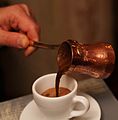Cezve
This article needs attention from an expert in Arab world. See the talk page for details. (August 2023) |

A cezve (Turkish: cezve, pronounced [dʒezˈve]; Serbo-Croatian: džezva / џезва; Arabic: جِذوَة), also ibriki/briki (Greek: μπρίκι), srjep (Armenian: սրճեփ) is a small long-handled pot with a pouring lip designed specifically to make Turkish coffee. It is traditionally made of brass or copper, occasionally also silver or gold. In more recent times cezveler are also made from stainless steel, aluminium, or ceramics.
Name
This article should specify the language of its non-English content, using {{lang}}, {{transliteration}} for transliterated languages, and {{IPA}} for phonetic transcriptions, with an appropriate ISO 639 code. Wikipedia's multilingual support templates may also be used. (January 2023) |
The name cezve is of Turkish origin, where it is a borrowing from Arabic: جِذوَة (jadhwa or jidhwa, meaning 'ember').
The cezve is also known as an ibrik, a Turkish word from Arabic إبريق (ʿibrīq), from Aramaic ܐܖܪܝܩܐ (ʾaḇrēqā), from early Modern Persian *ābrēž (cf. Modern Persian ābrēz), from Middle Persian *āb-rēǰ, ultimately from Old Persian *āp- 'water' + *raiča- 'pour' (cf. Modern Persian and Middle Persian ریختن [rêxtan]).[1][2]
Variations
In Bulgaria, Albania, Bosnia and Herzegovina, Croatia, Czechia, Montenegro, North Macedonia, Serbia, Slovakia and Slovenia, the cezve is a long-necked coffee pot. In Turkish an ibrik is not a coffee pot, but simply a pitcher or ewer.
Gallery
-
Copper cezve with Turkish coffee pouring out
-
Utensils to prepare Turkish coffee (handmade from Crete). A cezve is at the bottom.
-
Turkish coffee set containing a cup of coffee, a cezve and a sugar bowl
See also
- Dallah (Arabic coffee pot)
- Jebena (Ethiopian coffee pot)
- Arabic coffee
- Turkish coffee
- List of cooking vessels
References
- ^ Steingass, Francis Joseph (1992). A Comprehensive Persian-English Dictionary: Including the Arabic Words and Phrases to be Met with in Persian Literature, Being, Johnson and Richardson's Persian, Arabic, and English Dictionary, Revised, Enlarged, and Entirely Reconstructed. Asian Educational Services. ISBN 978-81-206-0670-8. page 8.
- ^ Arabic in Context: Celebrating 400 years of Arabic at Leiden University. BRILL. 6 June 2017. ISBN 9789004343047.
Sources
- alt.coffee thread archive regarding cezve word origin Archived 2011-05-14 at the Wayback Machine
- Comech's cezve page at tamu.edu Archived 2011-05-14 at the Wayback Machine
- Articles containing Turkish-language text
- Articles needing expert attention from August 2023
- All articles needing expert attention
- Arab world articles needing expert attention
- Articles with short description
- Short description is different from Wikidata
- Pages with Turkish IPA
- Articles containing Serbo-Croatian-language text
- Articles containing Arabic-language text
- Articles containing Greek-language text
- Articles containing Armenian-language text
- Pages with non-English text lacking appropriate markup and no ISO hint
- Pages with non-English text lacking appropriate markup from January 2023
- Articles containing Persian-language text
- Webarchive template wayback links
- Cooking vessels
- Coffee preparation
- Turkish words and phrases
- Coffee culture in Bosnia and Herzegovina
- Food and drink in Turkey


